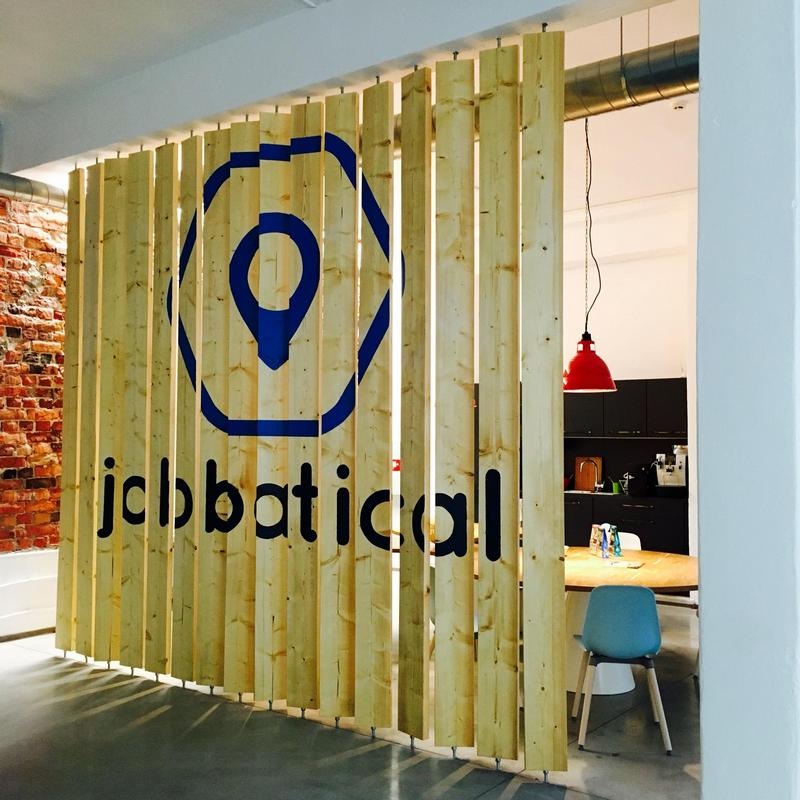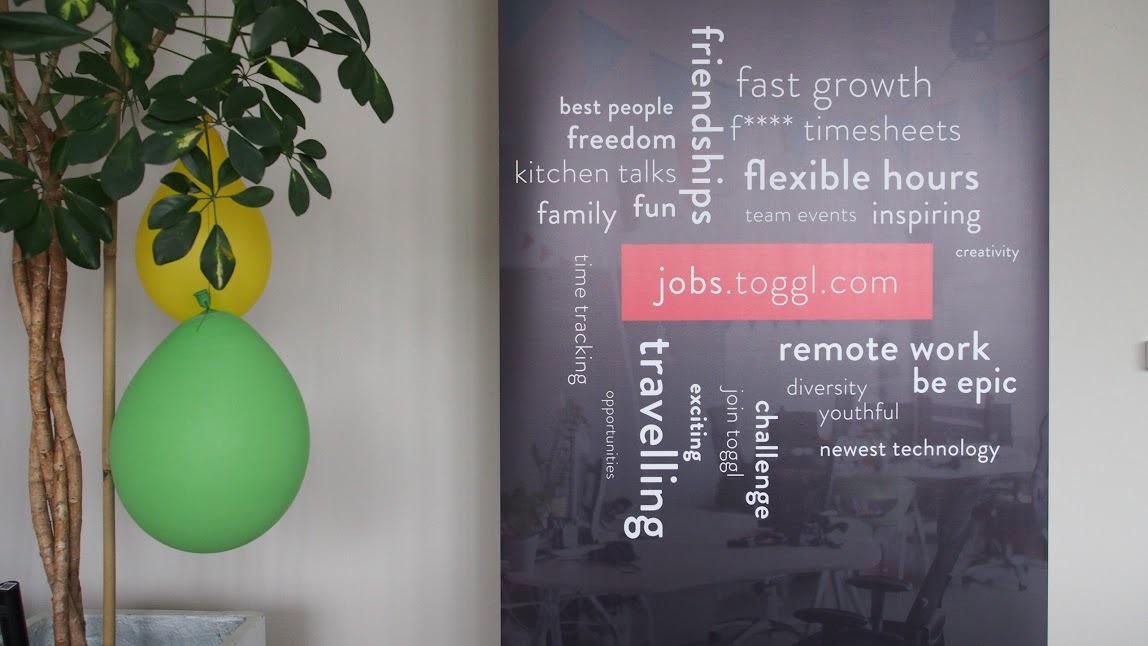02Building distributed teams: everything you need to know
Luckily for you, all these things are learnable, and the more people you hire remotely, the better you’ll get at recognizing a good match. Also, something to always keep in mind is that being a remote team, your talent pool is literally the entire world.
Imagine how many amazing, talented, smart and witty people there are out there, with skillsets that are just right for your company. So much better than being constricted to finding someone from just one geographical area, no?
Now you just have to put your job ad up, and wait for the applications to come in. A great place to post your remote jobs is Remotive, they have very popular remote job board along with an engaged community of remote workers.
Even though it’s possible to gradually adjust to certain aspects remote work and learn to be effective in the environment, there are some certain personal traits to look for (and some to be wary of) when hiring remote employees—regardless of whether they have worked in a remote environment before or not.
Things that pretty much need to be embedded in a person’s personality naturally, and are hard to learn, include:
- Strong self-discipline
- Great communication skills
- Strong organization skills
- Ability to work extremely effectively in a team environment
And some things that can be learned and/or not crucial to making a remote hire (and therefore lacking them should not necessarily be taken as a red flag) are:
- Avoiding distractions when working from home or remotely in general
- Virtual collaboration skills and impeccable attention to transparency
Regardless of learnability, let’s take a closer look at some good signs to keep an eye out for when talking to potential hires:
Look for people who know how to build their work flow for maximum productivity regardless of the environment they’re in. Ask about how they would make sure they get things done on their own:
- Do they have a tendency to stay organized with task apps, to-do lists and flow boards?
- Do they track their time to know how much time they’re spending on work in general as well as specific tasks?
- Do they take regular breaks between work to make sure they stay focused and productive?
- Do they have a designated work area (or if they don’t have previous remote work experience, whether they’re planning to have one) to make sure they’re in the right mindset for being productive?
Strong organization skills are pretty much a must, and a planned work environment is always a plus. Alex Turnbull, CEO and founder of Groove, one of the leading companies embracing remote work, says this is actually one of the main things to pay attention to when talking to candidates:

Emphasis on might not be ready, though—an applicant not having thought about that aspect yet doesn’t necessarily mean they never will. But if they have, it’s a good sign that they’re fully prepared to learn the ways of remote work, even if they’ve never done it before.
An important thing to keep in mind that it’s not just the frequency of communication that you should be looking for, but the quality of it.
This is a convenient thing to look at while interviewing someone when it comes to both calls and written communication:
- Is the candidate clear and concise in their communication, and gets to the point straight away rather than creating walls of text and/or speech that are hard to decipher into useful or relevant information?
- Are they super aware of the fact that in a remote environment, there are possibly people all around the world, and therefore handle scheduling well between timezones and locations? (Plus points if they actually offer up several available times to chat, and take into account what time it is where you are, too.)
- Do they respond to important messages/information/questions in a timely manner?
Top-of-the-notch communication skills are something that’s very important in the hiring process for FlexJobs, too:

Working in a remote team can be challenging and create some tension, in addition to the general stress factors for working for any fast-paced company. One of the main things that keeps a lot of remote teams together and sane is a sense of humor, and it’s widely considered an important key to building a successful team culture. So, your applicant not taking themselves too seriously is probably a good sign.
There are, however, many different levels to humor, and picking the right amount of it obviously depends on your company—if you’re hiring for a super corporate and serious environment, you probably don’t want someone who treats every conversation like a stand-up comedy set, regardless of the topic.
This is one of the most important things in a remote environment, right up there with the actual skillset and huge amounts of self-discipline. What defines a culture match for you depends entirely on your company, so you’ll have to figure that out (we’ll touch on defining and building team culture in a later chapter).
A strong personality match with existing employees is especially important for small teams where everyone works closely together regardless of their position. What that personality match looks like for you, depends, again, on you and your existing team. Culture match is a good place to listen to your “gut” alongside hard information. Like they say in Toggl Track: "If it's not hell yeah then it's hell no".
If you can, it’s also useful to set up a trial period with the person you think is suitable, to make sure sure that this person is able to work well with your team and adjust to the culture, communication and values.
Another good thing to ask about alongside organization and work skills are strong personal wind-down scheduling skills:
- Do they take regular breaks in between working to help keep their focus?
- Do they have the ability to “switch off” after work and wind down? Or are they the kind of person who keeps going endlessly?
These skills are especially important in a remote team, because when there are no restrictions to work time (such as a nine to five), it can be hard to stop working:

Working in any fast-paced company, especially a small one, can be a stressful experience day-to-day, and remote work with all its additional challenges adds some pressure as well. Being able to treat themselves well to avoid overworking and burnout is a good sign.
Since remote work requires a lot of independence and pretty much eliminates any constant hand-holding by anyone, it’s important for the applicant to clearly be able to think for themselves, connect the dots, start processes, however—still be able to ask for help when they absolutely need it.

We present it in a way that gives them the information but also requires them to connect some dots themselves. It’s reflective of how we work together and an important trait for all of our employees to have. Carol Cochran, FlexJobs
Jobbatical also has a strong standpoint when it comes to looking for independence and courage to start things:

You've got to get people in the door who are daring enough to dive in headfirst and hack (as well as finesse) their way through to success. Lauren Proctor, Jobbatical
If you’ve ever hired anyone and had to go through the applications, you know that there’s a staggering amount of people who put little to no effort into their job application—mostly because it’s approximately their fifteenth sent that day and they don’t have the time to personalize them. This is a bad sign.
Look for the opposite of that—look for personalization, investment, interest, and signs that the person is genuinely interested in you. Not just any job, but this one in particular, and is passionate about getting it.

Those are just some of the things to look out for as signs of a good fit for a remote team. However, if a candidate lacks in a few of these departments, don’t take it as a deal-breaker immediately. Some things, such as transparent documentation of your work, learning to schedule between time zones etc are entirely learnable with enough determination, and might just be an unfamiliar territory that’s fairly painless to become acquainted with.
Also, keep in mind that interviewing for a job is a scary process, and some people, especially during the first call, are simply nervous.
As much as certain things should not be treated as necessary deal breakers, here are some red flags, which, if they happen a lot during the interviewing process, might mean that the candidate isn’t cut out for a remote environment, and might cost you more than just money if you end up hiring them.
If it takes them a week to respond to your emails, it means that either a) they aren’t too bothered with you, or b) they’re just generally slow when it comes to their response and communication process.
Either way, this is a big no-no in a remote environment. Especially in a small team where employees depend heavily on each other to progress, if a person is unreachable or unresponsive for days in a row, that can mean a huge delay in work for everyone.
Being slow already during the interviewing process means that being reasonably swift in communication doesn’t come naturally to the person and they might struggle with it in their everyday work as well.
Obviously it’s too much to expect for someone to get on a job interview with you at 3AM in the morning, but if they brush off several reasonable times for an interview, it might mean that they’re not flexible enough when it comes to arranging their work meeting schedule, either.
In many remote teams, there are employees literally all across the globe, so sometimes compromising when it comes to big team calls is important.
Since communication and building relationships takes a lot more effort in a remote team, it’s that much more crucial to make sure that a new team member is the kind of person that would most likely adhere with existing team members well.
This, again, depends entirely on the kind of culture you’ve built. Be honest with yourself about this—a person can be a perfect fit when it comes to their skillset and experience, but if they’re not a culture fit, they won’t thrive in your environment.
There are also mistakes that are easy to make on the employer’s side when hiring remote employees that have nothing to do with the candidates, their skills or their personality. Such as:
Not consulting your team about the hire: unless you’re the only person in the company, it’s always useful to have your candidate chat with other people in the team as well as yourself.
It’s the classic many eyes theory—having several different people on one topic means there’s a variety of standpoints and opinions, which, in the end, makes the decision more calculated and reasonable.

Whether we want it or not, we’re biased as people, and tend to sometimes overlook things that might actually be important, or vice versa—concentrate too much on something that isn’t crucial in the current situation.
Not sharing enough information about how you work as a team: this is especially important when your candidate has not worked remotely before. Communication and collaboration work very differently in remote teams as opposed to “traditional” ones, and it’s crucial to give your inexperienced candidate a heads up about it, so if they feel like it’s something they’re not ready for, they can opt out as soon as possible.

They might think that remote work is something they can easily conquer, but that’s because they haven’t had to thrive in that environment before. So, it’s super important to make sure you explain—in abundant detail—the practices that go into making your remote team tick.
No face-to-face communication (video calls): one of the most important things remote work is lacking is face time with team members. A lot of remote teams make it one of their top priorities to make sure that coworkers can see each other, eye to eye, on a regular basis—even if that means pixels on the screen.
You shouldn’t neglect this with people you’re interviewing, either. Body language, expressions and behaviour can clearly be seen on a screen as well as in person.
Yes, culture fit is a very important thing to keep in mind. Yes, it’s great if a potential hire can make you laugh, and you have a nice chat, and they seem charming, witty and all-round awesome. However, don’t make the mistake of taking all this and considering it to be largely more important than actual work-related skills.
Someone can be the coolest person ever, thrive immaculately in a remote environment and so on, but if they’re lacking when it comes to the skillset that is needed to actually do the work that is required for the position you’re hiring for, it’s not a good fit. Again, be very honest about this, and don’t let a good culture fit alone cloud your decision making.
Your talent pool is immense when hiring remotely. If you have no restrictions as to where your team members can work from, you’re opening up a job position for literally everyone in the world. That’s a lot of people, and if you do a good job at advertising the open position, it also means that you’ll get tons and tons of applications
If you’re not used to going through the hiring process, and even more importantly—if you don’t have anyone to deal with it for you, it can be an intimidating process, and might make you—even if it is subconsciously—settle for the first candidate that seems to tick the boxes.
Setting high standards for your new hires means doing a favor to your entire team. Settling immediately and hiring a person who might not actually be the greatest fit in the long run means that you’ll be spending a lot more time dealing with the implications of trying to fix the resulting mess than you ever will on screening all potential candidates carefully and making a reasonable, heavily calculated decision.

There are certain things you should tell your candidates already during the hiring process to make sure they’re aware of things work in your (remote) company. Some of these things include:
- Making sure they’re aware of the challenges (and benefits) that come with working remotely: if they haven’t worked in a remote environment before, explain the pros and cons mentioned previously, and try to understand whether or not they’d be willing to work hard to make it happen.
- Previous experience: if they do have remote working experience, see how the system has worked in their previous workplaces and if there are any significant differences.
- Your vacation policy: this varies a lot in different companies. Regardless of whether you have an open vacation policy or a fixed arrangement, make sure they’re aware of the terms when it comes to their time off.
- Your core values: this is when it comes in handy to have these values publicly out there in written form, or at least easily accessible. Any potential hire should be aware of what you find important and what/how you’re working towards.
- Your communication guidelines: as mentioned, communication is a core thing to focus on in any remote company, so it’s important that your potential employee is in the loop about it.
- The team: how many people you have (and have had), where they work from, what they do, who your new hire would be working closely with.
- Salary details: how much compensation they would be receiving, how are the payments handled between countries, any taxation topics that need to be tackled, etc.

Continue reading
- 01 Why go remote - the pros and cons of becoming part of a distributed team.
- 02 Building distributed teams: everything you need to know
- 03 Hiring remote talent: How to set up a successful remote hiring pipeline
- 04 Growing your remote team: how to onboard new members and set expectations
- 05 How to make remote teams work: Culture is crucial
- 06 How to lead a great remote team: the importance of letting go